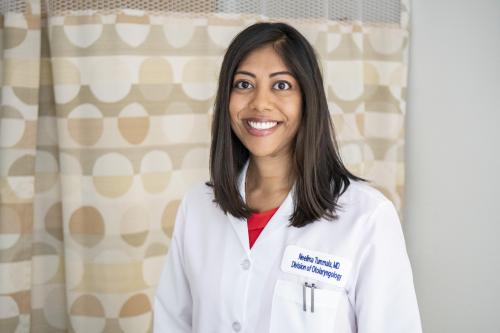View this story on Adobe Express
By Anneliese Palmer
Floods, droughts, wildfires, extreme temperatures, and storms disrupt our lives and are the kinds of climate-related extreme events that will increase in frequency and intensity. No matter where you live, or how high your socio-economic status, climate change is also an increasing health crisis.
Heatwaves kill. Infectious diseases spread. People lose access to safe and nutritious food. According to a recent report of The Lancet Countdown on health and climate change, an international research collaboration that tracks how health is being affected, high temperatures increase cardiovascular disease and exacerbate asthma symptoms, among many other health issues, giving decision makers undeniable evidence to promote change for public health.
Dr. Neelima Tummala, an ear, nose and throat surgeon and assistant professor at the George Washington University’s School of Medicine, and co-director of the Climate and Health Institute, observes how her patients frequently struggle with their health during climate-related events and she’s speaking out, publishing commentary and opinion articles in Newsweek, Scientific American, CNN, The Hill, USA Today, and others, sharing health perspectives on policy and stories on how she witnesses the effects of climate change play out in the bodies of her patients.
Tummala remembers one 68-year-old patient, who arrived at her clinic on a hot day and in clear distress. The patient was tired. She could barely talk. She was sweating and having trouble breathing. The patient lives a mile from the clinic but had missed her bus and decided to walk because she didn’t want to also miss the appointment. It was June in Washington, D.C., and temperatures were hot and humid.
“This distance might be a 15-minute walk for many people, but it took this patient, who walks with the aid of a cane, 45-minutes,” said Tummala. “The woman has swollen ankles and walks really slow down the sidewalk. She had just been exerting herself outside, exposed to heat and poor air quality, for most of an hour.”
The clinician and team cared for the patient during the visit and helped the woman negotiate the journey home by taxi. On a subsequent visit, however, Tummala and her patient talked about it. The patient opened up about what it feels like to live on the top floor of an apartment building amid rising temperatures and declining air quality.
Tummala asked the woman if she could share her story. The patient immediately agreed, and underscored the need to communicate the voices of vulnerable populations that are disproportionately affected by climate change. She asked the doctor to explain her predicament because, as Tummala recalls, “‘no one cares about us. We feel everyone has forgotten about us.’” The story appeared in Newsweek.
In Scientific American, Tummala wrote about another patient, a grandmother who arrived late for her appointment during a heat wave in July. The woman had been awake all night, walking around the train station with her grandchild, because there was no air conditioning at home and the baby was sweating so much that she risked dehydration.
Tummala first connected the issues of climate change and health while attending former vice president Al Gore’s Climate Reality Leadership Training in 2018. Five years later, she joined the executive committee at the Medical Society Consortium on Climate and Health, whose member organizations represent over 700,000 professionals and provides trainings and webinars on communicating about climate change, advocating for policy interventions, and engaging with the public.
Healthcare professionals are increasingly engaging in climate-conscious dialogues with their patients, the public, and healthcare institutions because climate change is a medical problem. In addition to the Medical Society Consortium’s climate advocacy toolkits, an association of state networks provides deep insights into local climate and health issues. They’ve partnered with numerous groups, including the National Association of Community Health Centers, to help health centers implement climate and health resilience measures and support their communities to do the same. These range from financial and energy efficiency measures, as well as provide health resources, available through the Inflation Reduction Act.
Climate-related influences, that include air pollution, water quality, disasters, and environmental health issues such as microplastics, are becoming a growing parental concern for children's health. Recently, the U.S. Environmental Protection Agency updated the National Ambient Air Quality Standards for particulate matter (PM). The primary annual standard for fine particulate matter (PM2.5) is now set at 9 µg/m3, down from 12 µg/m3, while the other standards for particulate matter remain unchanged. Starting in May 2024, the EPA's new limit will take effect.
Before the ruling, Tummala argued in a commentary in The Hill that the EPA should take advantage of the chance to improve air quality. Globally, air pollution caused 6.7 million deaths in 2019. Fine particulate matter is a major public health threat, increasing the risk of death from lung cancer, heart disease, and dementia in the US.
“So what really is the cost of improving our air?” she wrote. “As physicians, we do our best to treat patients with medications and lifestyle interventions, but really, it’s hopeless unless we clean up the air and the environment in which our patients live.”
When she started working on climate advocacy, Tummala admits she “didn’t know anything,” she said, recalling her time seated in the room with Climate Reality Leadership Training cohort. Now, she’s become a leading public voice on climate and health, writing commentary and opinion articles to become a trusted messenger in raising public awareness of the threats to health and adding medical expertise to policy dialogues.
Anneliese (Lisa) Palmer is Journalist in Residence at the GW Alliance for a Sustainable Future. She is a Research Professor of Science Communication at the Columbia College of Arts and Sciences and Senior Editor at Planet Forward.




